
Karl Ludwig Pfau (German: [ˈluːtviçˈpfaʊ] ⓘ ; August 25, 1821 – April 12, 1894) was a German poet, journalist, and revolutionary. He was born in Heilbronn and died, aged 72, in Stuttgart.

Karl Ludwig Pfau (German: [ˈluːtviçˈpfaʊ] ⓘ ; August 25, 1821 – April 12, 1894) was a German poet, journalist, and revolutionary. He was born in Heilbronn and died, aged 72, in Stuttgart.
Some of Ludwig Pfau's poetry has been used in the composition of Kunstlieder (or more popularly in English, Lieder). Many German texts, including texts set to music by Schoenberg, have been collected and housed on-line at The LiederNet Archive. Many are available in English translation in this collection.

Johann Carl Gottfried Loewe, usually called Carl Loewe, was a German composer, tenor singer and conductor. In his lifetime, his songs ("Balladen") were well enough known for some to call him the "Schubert of North Germany", and Hugo Wolf came to admire his work. He is less known today, but his ballads and songs, which number over 400, are occasionally performed.

German Romanticism was the dominant intellectual movement of German-speaking countries in the late 18th and early 19th centuries, influencing philosophy, aesthetics, literature, and criticism. Compared to English Romanticism, the German variety developed relatively early, and, in the opening years, coincided with Weimar Classicism (1772–1805).

Eduard Friedrich Mörike was a German Lutheran pastor who was also a Romantic poet and writer of novellas and novels. Many of his poems were set to music and became established folk songs, while others were used by composers Hugo Wolf and Ignaz Lachner in their symphonic works.
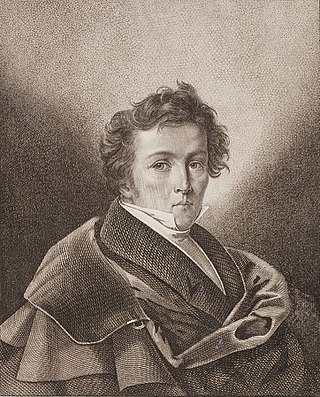
Johann Ludwig Wilhelm Müller was a German lyric poet, best known as the author of Die schöne Müllerin (1821) and Winterreise (1823). These would later be the source of inspiration for two song cycles composed by Franz Schubert.

Ferdinand Freiligrath was a German poet, translator and liberal agitator, who is considered part of the Young Germany movement.
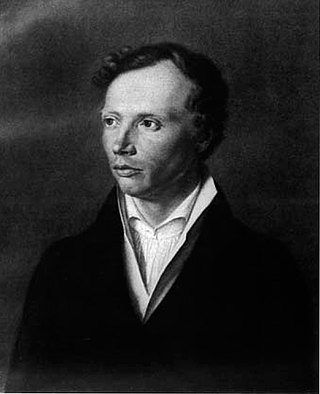
Johann Ludwig Uhland was a German poet, philologist, literary historian, lawyer and politician.

Nikolaus Lenau was the pen name of Nikolaus Franz Niembsch Edler von Strehlenau, a German-language Austrian poet.

"De Brevitate Vitae", more commonly known as "Gaudeamus igitur" or just "Gaudeamus", is a popular academic commercium song in many European countries, mainly sung or performed at university graduation ceremonies. Despite its use as a formal graduation hymn, it is a jocular, light-hearted composition that pokes fun at university life. The song is thought to originate in a Latin manuscript from 1287. It is in the tradition of carpe diem with its exhortations to enjoy life. It was known as a beer-drinking song in many early universities and is the official song of many schools, colleges, universities, institutions, student societies and is the official anthem of the International University Sports Federation.
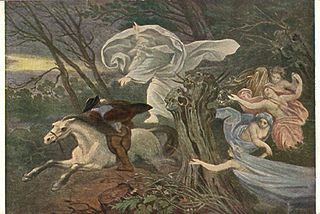
"Erlkönig" is a poem by Johann Wolfgang von Goethe. It depicts the death of a child assailed by a supernatural being, the Erlking, a king of the fairies. It was originally written by Goethe as part of a 1782 Singspiel, Die Fischerin.

A Burschenschaft is one of the traditional Studentenverbindungen of Germany, Austria, and Chile . Burschenschaften were founded in the 19th century as associations of university students inspired by liberal and nationalistic ideas. They were significantly involved in the March Revolution and the unification of Germany. After the formation of the German Empire in 1871, they faced a crisis, as their main political objective had been realized. So-called Reformburschenschaften were established, but these were dissolved by the Nazi regime in 1935/6. In West Germany, the Burschenschaften were re-established in the 1950s, but they faced a renewed crisis in the 1960s and 1970s, as the mainstream political outlook of the German student movement of that period started leaning more towards the left. Roughly 160 Burschenschaften exist today in Germany, Austria and Chile.

Karl Ludwig Freiherr von Pöllnitz was a German adventurer and writer from Issum.
Urian is a Celtic noble male given name. It is recorded in 1273 in the Hundred Rolls of Huntingdonshire in a reference to a "John, son of Urian". In the 12th century, Geoffrey of Monmouth used the Latinized form Urbianus for the semi-legendary British king Urien.
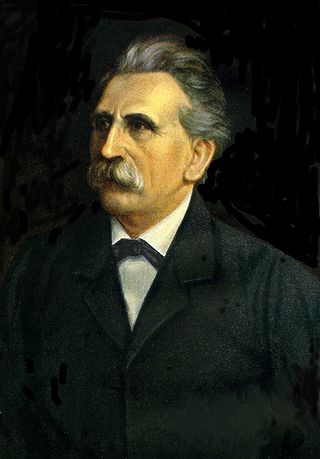
Friedrich Wilhelm Weber was a German doctor, politician of the Prussian House of Deputies, and poet.
Pfau is a German surname meaning "peacock".

In the Western classical music tradition, Lied is a term for setting poetry to classical music. The term is used for any kind of song in contemporary German and Dutch, but among English and French speakers, lied is often used interchangeably with "art song" to encompass works that the tradition has inspired in other languages as well. The poems that have been made into lieder often center on pastoral themes or themes of romantic love.
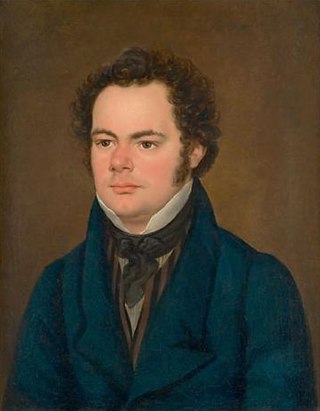
"Rastlose Liebe" is a Lied composed by Franz Schubert and published in July 1821 as Op. 5, No. 1. In Otto Erich Deutsch's catalog it is D138. The song, dedicated to Anton Salieri, is based on a text by Johann Wolfgang von Goethe, written during a snowstorm in the Thuringian Forest.
Mignon, a character appearing in Johann Wolfgang von Goethe's writings such as Wilhelm Meister's Apprenticeship and Wilhelm Meister's Journeyman Years, is the subject of several Lieder by Franz Schubert.

"Das Wandern ist des Müllers Lust" is the first line of a poem by Wilhelm Müller, written in 1821 with the title "Wanderschaft" as part of a collection, Die schöne Müllerin. While wandern is defined as "hiking" today, it referred to the required journeyman years of craftsmen when written, in this case of a miller.
Pauline Volkstein was a German composer of over 1,000 songs.
Wilhelmine von Schwertzell (1787-1863) was a German author, lieder composer, and folklorist who helped Wilhelm Grimm collect fairy tales.